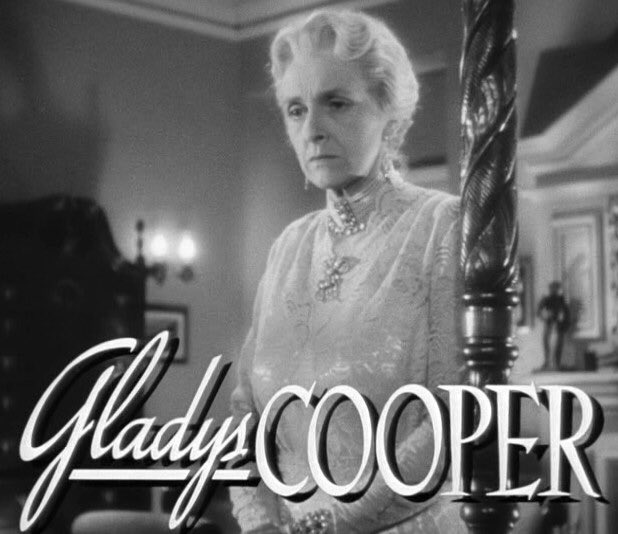A friend said to me last week that he’d never seen a certain film because “I always thought it was camp and not for me.” I thought of this as we sat down to watch Hal Wallis’ Now Voyager (1942) - in a new, magnificent restoration by @Criterion - last night. I hear this all ...
... the time. It usually refers to those classic Hollywood romantic melodramas from the 1930s through the 1950s also known as “women’s pictures.” It’s the genre I have the hardest time getting people to appreciate. My first bit of advice is take the film seriously, remove ...
... yourself from 2019, and look at the film on its terms not yours. The film has magnificent performances by Bette Davis, Claude Rains, and Gladys Cooper. Paul Henreid - in a role in which George Brent would have been far superior- is his usual lifeless self displaying no ...
... star quality whatsoever. Director Irving Rapper called him “that big liar.” Davis is at her most natural here, having been coached throughout film by William Wyler. A fact not mentioned in the documentaries on the disc (which is why you shouldn’t bother with those) ...
... since no one commenting here knew any of the principals and is just repeating what they read in a book. Claude Rains as the psychiatrist is superb and his scenes with Davis are masterclasses. One only wishes there was more of him ...
... Gladys Cooper, in an Oscar nominated performance, plays brilliantly one of those soul-destroying mothers that, sadly, don’t only exist in Hollywood films. She is chilling. You expect her to spit fire the way she spews her lines. It’s a ferocious portrayal ...
... this film gives me a perfect opportunity to demonstrate why this is a “Hal Wallis film” - the producer - and not an “Irving Rapper film” - the director. Like Curtiz, Rapper was a good studio employee who did what he was told. But artistic - and all other - decisions...
... were made by the producer Hal Wallis. Here’s an example. Rapper filmed a scene with Charlotte Vale and Lise showing them at a beauty parlor and Charlotte’s transformation into the beauty she really is. Wallis took one look at it and said “NO!” He felt the audience ...
... should be stunned by the change in her and so told Rapper to film in like this. You’ll see it below from the shoes up and it’s one of the most stunning scenes in the film ...
...there’s much to say about the psychology in the film both good and bad but that’s for another time. I must mention Max Steiner’s memorable score, one of his greatest. His beautiful love theme - not heard until 30 minutes into the film - is so emotional and lovely that ...
... it is practically a touchstone for all the romantic melodramas of the era, a template as you will. There are lines here that touch me deeply but that audiences often chuckle at: “are you Miss or Mrs?” “Aunt” is the reply. “No one ever called me darling before” she says ...
... if you try to immerse yourself in this kind of film you won’t chuckle. Of course, gay men for decades have taken ownership of the final scene in drag clubs etc and it may be impossible to ever reclaim it from that associstion. Try. Because it is quite moving ...
Highest recommendation for a film that is one of the greatest examples of the classic women’s picture, something that no longer exists today. We’re the poorer for it.  https://abs.twimg.com/emoji/v2/... draggable="false" alt="⭐️" title="Medium star" aria-label="Emoji: Medium star">
https://abs.twimg.com/emoji/v2/... draggable="false" alt="⭐️" title="Medium star" aria-label="Emoji: Medium star"> https://abs.twimg.com/emoji/v2/... draggable="false" alt="⭐️" title="Medium star" aria-label="Emoji: Medium star">
https://abs.twimg.com/emoji/v2/... draggable="false" alt="⭐️" title="Medium star" aria-label="Emoji: Medium star"> https://abs.twimg.com/emoji/v2/... draggable="false" alt="⭐️" title="Medium star" aria-label="Emoji: Medium star">1/2.
https://abs.twimg.com/emoji/v2/... draggable="false" alt="⭐️" title="Medium star" aria-label="Emoji: Medium star">1/2.

 Read on Twitter
Read on Twitter





 https://abs.twimg.com/emoji/v2/... draggable="false" alt="⭐️" title="Medium star" aria-label="Emoji: Medium star">https://abs.twimg.com/emoji/v2/... draggable="false" alt="⭐️" title="Medium star" aria-label="Emoji: Medium star">1/2." title="Highest recommendation for a film that is one of the greatest examples of the classic women’s picture, something that no longer exists today. We’re the poorer for it. https://abs.twimg.com/emoji/v2/... draggable="false" alt="⭐️" title="Medium star" aria-label="Emoji: Medium star">https://abs.twimg.com/emoji/v2/... draggable="false" alt="⭐️" title="Medium star" aria-label="Emoji: Medium star">https://abs.twimg.com/emoji/v2/... draggable="false" alt="⭐️" title="Medium star" aria-label="Emoji: Medium star">1/2." class="img-responsive" style="max-width:100%;"/>
https://abs.twimg.com/emoji/v2/... draggable="false" alt="⭐️" title="Medium star" aria-label="Emoji: Medium star">https://abs.twimg.com/emoji/v2/... draggable="false" alt="⭐️" title="Medium star" aria-label="Emoji: Medium star">1/2." title="Highest recommendation for a film that is one of the greatest examples of the classic women’s picture, something that no longer exists today. We’re the poorer for it. https://abs.twimg.com/emoji/v2/... draggable="false" alt="⭐️" title="Medium star" aria-label="Emoji: Medium star">https://abs.twimg.com/emoji/v2/... draggable="false" alt="⭐️" title="Medium star" aria-label="Emoji: Medium star">https://abs.twimg.com/emoji/v2/... draggable="false" alt="⭐️" title="Medium star" aria-label="Emoji: Medium star">1/2." class="img-responsive" style="max-width:100%;"/>


